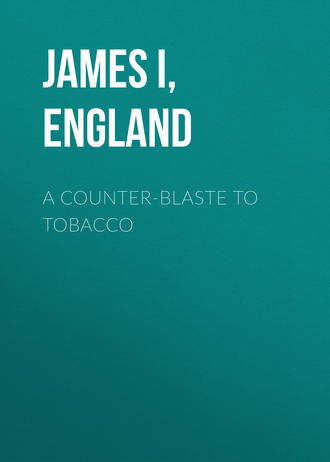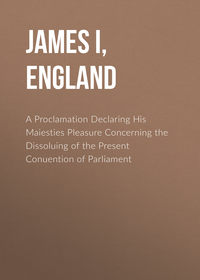 полная версия
полная версияA Counter-Blaste to Tobacco
Thus hauing, as I truste, sufficiently answered the most principall arguments that are vsed in defence of this vile custome, it rests onely to informe you what sinnes and vanities you commit in the filthie abuse thereof. First are you not guiltie of sinnefull and shamefull lust? (for lust may bee as well in any of the senses as in feeling) that although you bee troubled with no disease, but in perfect health, yet can you neither be merry at an Ordinarie, nor lasciuious in the Stewes, if you lacke Tobacco to prouoke your appetite to any of those sorts of recreation, lusting after it as the children of Israel did in the wildernesse after Quailes? Secondly it is, as you vse or rather abuse it, a branche of the sinne of drunkennesse, which is the roote of all sinnes: for as the onely delight that drunkards take in wine is in the strength of the taste, and the force of the fume thereof that mounts vp to the braine: for no drunkards loue any weake, or sweete drinke: so are not those (I meane the strong heate and the fume), the onely qualities that make Tobacco so delectable to all the louers of it? And as no man likes strong headie drinke the first day (because nemo repente fit turpissimus), but by custome is piece and piece allured, while in the ende, a drunkard will haue as great a thirst with a draught as when hee hath need of it: So is not this the very case of all the great takers of Tobacco? which therefore they themselues do attribute to a bewitching qualitie in it. Thirdly, is it not the greatest sinne of all, that you the people of all sortes of this Kingdome, who are created and ordeined by God to bestowe both your persons and goods for the maintenance both of the honour and safetie of your King and Commonwealth, should disable yourselves in both? In your persons hauing by this continuall vile custome brought yourselues to this shameful imbecilitie, that you are not able to ride or walke the journey of a Jewes Sabboth, but you must haue a reekie cole brought you from the next poore house to kindle your Tobacco with? where as he cannot be thought able for any seruice in the warres, that cannot endure oftentimes the want of meate, drinke, and sleepe, much more then must hee endure the want of Tobacco. In the times of the many glorious and victorious battailes fought by this nation, there was no word of Tobacco. But now if it were time of warres, and that you were to make some sudden Caualcado8 vpon your enemies, if any of you should seeke leisure to stay behinde his fellowe for taking of Tobacco, for my part I should neuer bee sorie for any euill chance that might befall him.9 To take a custome in any thing that bee left againe, is most harmefull to the people of any land. Mollicies and delicacie were the wracke and ouerthrow, first of the Persian, and next of the Romane Empire. And this very custome of taking Tobacco (whereof our present purpose is), is euen at this day accounted so effeminate among the Indians themselues, as in the market they will offer no price for a slaue to be sold, whome they finde to be a great Tobacco taker.
Now how you are by this custome disabled in your goods, let the gentry of this land beare witnesse, some of them bestowing three, some foure hundred pounds a yeere10 vpon this precious stinke, which I am sure might be bestowed vpon many farre better vses. I read indeede of a knauish Courtier, who for abusing the fauour of the Emperour Alexander Seuerus his master by taking bribes to intercede, for sundry persons in his master's eare (for whom he neuer once opened his mouth) was iustly choked with smoke, with this doome, Fumo pereat, qui fumum vendidit: but of so many smoke-buyers, as are at this present in this kingdome, I neuer read nor heard.
And for the vanities committed in this filthie custome, is it not both great vanitie and vncleanenesse, that at the table, a place of respect, of cleanlinesse, of modestie, men should not be ashamed, to sit tossing of Tobacco pipes, and puffing of the smoke of Tobacco one to another, making the filthie smoke and stinke thereof, to exhale athwart the dishes, and infect the aire, when very often, men that abhorre it are at their repast? Surely Smoke becomes a kitchin far better then a Dining chamber, and yet it makes a kitchen also oftentimes in the inward parts of men, soiling and infecting them, with an vnctuous and oily kinde of Soote, as hath bene found in some great Tobacco takers, that after their death were opened. And not onely meate time, but no other time nor action is exempted from the publicke vse of this vnciuill tricke: so as if the wiues of Diepe list to contest with this nation for good maners their worst maners would in all reason be found at least not so dishonest (as ours are) in this point. The publike vse whereof, at all times, and in all places, hath now so farre preuailed, as diuers men very sound both in iudgement, and complexion, haue bene at last forced to take it also without desire, partly because they were ashamed to seeme singular (like the two Philosophers that were forced to duck themselues in that raine water, and so become fooles as well as the rest of the people) and partly, to be as one that was content to eate Garlicke (which he did not loue) that he might not be troubled with the smell of it, in the breath of his fellowes. And is it not a great vanitie, that a man cannot heartily welcome his friend now, but straight they must bee in hand with Tobacco? No it is become in place of a cure, a point of good fellowship, and he that will refuse to take a pipe of Tobacco among his fellowes, (though by his own election he would rather feele the sauour of a Sinke11) is accounted peeuish and no good company, euen as they doe with tippeling in the cold Easterne Countries. Yea the Mistresse cannot in a more manerly kinde, entertaine her seruant, then by giuing him out of her faire hand a pipe of Tobacco. But herein is not onely a great vanitie, but a great contempt of God's good giftes, that the sweetenesse of mans breath, being a good gift of God, should be willfully corrupted by this stinking smoke, wherein I must confesse, it hath too strong a vertue: and so that which is an ornament of nature, and can neither by any artifice be at the first acquired, nor once lost, be recouered againe, shall be filthily corrupted with an incurable stinke, which vile qualitie is as directly contrary to that wrong opinion which is holden of the wholesomnesse thereof, as the venime of putrifaction is contrary to the vertue Preseruatiue.
Moreouer, which is a great iniquitie, and against all humanitie, the husband shall not bee ashamed, to reduce thereby his delicate, wholesome, and cleane complexioned wife, to that extremetie, that either shee must also corrupt her sweete breath therewith, or else resolue to liue in a perpetuall stinking torment.
Haue you not reason then to bee ashamed, and to forbeare this filthie noueltie, so basely grounded, so foolishly receiued and so grossely mistaken in the right vse thereof? In your abuse thereof sinning against God, harming yourselues both in persons and goods, and taking also thereby the markes and notes of vanitie vpon you: by the custome thereof making your selues to be wondered at by all forraine ciuil Nations, and by all strangers that come among you, to be scorned and contemned. A custome lothsome to the eye, hatefull to the Nose, harmefull to the braine, dangerous to the Lungs, and in the blacke stinking fume thereof, neerest
resembling the horrible Stigian
smoke of the pit that is
bottomelesse.
1
This argument is merely that because an inferior race has made a discovery, a superior one would be debasing itself by making use of it.
2
By Sir Walter Raleigh, one of the greatest and most learned men of the age, whose head the author cut off, partly influenced, no doubt, by his detestation of tobacco. Smokers may therefore look upon the author of the "History of the World" as the first martyr in their cause.
3
A centenarian has recently died, the papers relate, who, till within a few days of his death, was in perfect health, having been a constant smoker, but was unfortunately induced by his friends to give up the habit, from which moment he rapidly sank. Probably these barbarians were affected in the same manner.
4
Had the royal pedant ever heard of locking the stable door after the horse has been stolen?
5
The previous arguments can of course have no weight in our day, but this tendency to imitate others is as true now as then. Evidently, if the Darwinian theory holds good, a matter of three centuries is not sufficient to cause any perceptible diminution in the strength of original instinct inherited from the ape.
6
Time has taken upon itself to upset this argument; for though the novelty may certainly be said to have worn off, the habit itself is more firmly rooted than ever.
7
This shows that so late as the 17th century the influence of the planets on the body was an article of firm belief, even amongst the learned. The following recipes may be of interest to the reader. They are taken from a manuscript volume which belonged to and was probably written by Sir John Floyer, physician to King Charles II., who practised at Lichfield, in the Cathedral library of which city the volume now is:—"An antidote to ye plague: take a cock chicken and pull off ye feathers from ye tayle till ye rump bee bare; you hold ye bare of ye same upon ye sore, and ye chicken will gape and labour for life, and in ye end will dye. Then take another and do ye like, and so another still as they dye, till one lives, for then ye venome is drawne out. The last chicken will live and ye patient will mend very speedily."
"Madness in a dog: 'Pega, Tega, Sega, Docemena Mega.' These words written, and ye paper rowl'd up and given to a dog, or anything that is mad, cure him."
8
Or Camisado. A night attack on horseback, wherein the attacking party put their shirts on over their armour, in order to recognise each other in the darkness. Charles II. attempted a Camisado at Worcester, which did not succeed, owing to treachery.
9
Our royal author would no doubt have been astonished to see English officers smoking on the field of battle, which I am told is now a common occurrence.
10
It was not dreamt of in James's philosophy, that the price of tobacco might fall to 5s. 6d. and less a pound.
11
They still say in Scotland, "To feel a smell."



